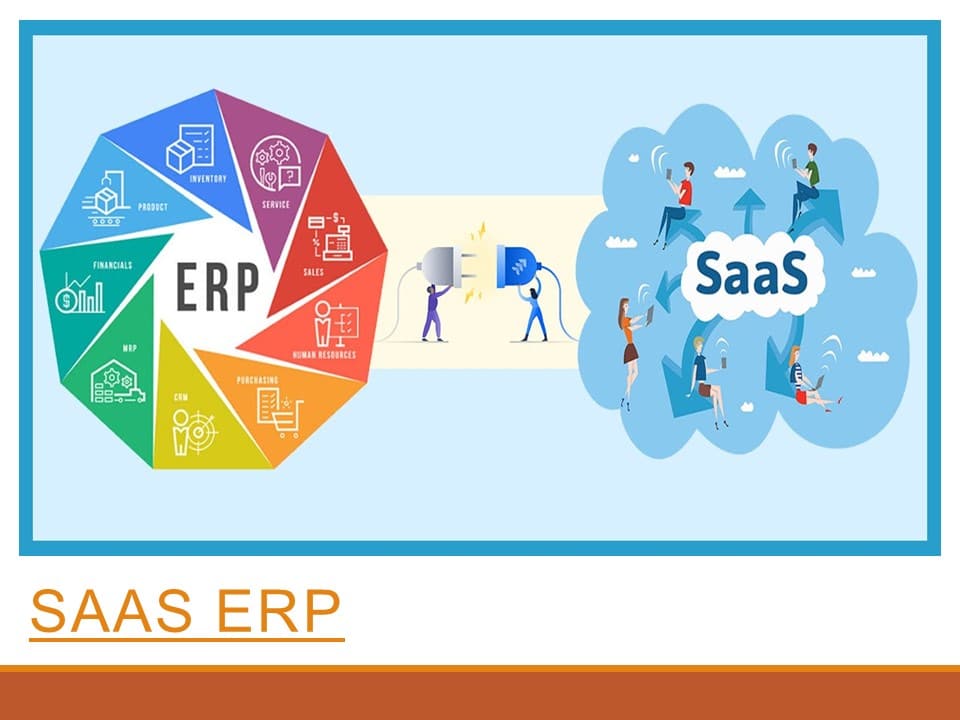SaaS ERP stands for Software as a Service Enterprise Resource Planning. It combines two key concepts: ERP, which refers to Enterprise Resource Planning software used to manage various aspects of a business, and SaaS, which stands for Software as a Service, a software distribution model where applications are hosted by a third-party provider and made available to customers over the internet.

SaaS ERP provides companies with access to ERP functionalities through a cloud-based platform. This means users can access the ERP system remotely via the internet without needing to install or maintain software on their local computers. It typically covers various business functions such as accounting, human resources, supply chain management, customer relationship management, and more, all integrated into one system.
The advantages of SaaS ERP include lower upfront costs, easier scalability, regular updates and maintenance handled by the provider, accessibility from anywhere with an internet connection, and often a pay-as-you-go subscription model.
What is SaaS ERP?
SaaS ERP, an acronym for Software as a Service Enterprise Resource Planning, merges the prowess of ERP systems with the convenience and scalability of cloud-based services. At its core, ERP software encompasses a suite of integrated applications designed to oversee and optimize various facets of business functions, including but not limited to finance, HR, supply chain, manufacturing, and customer relationship management.
The Essence of SaaS in ERP
The distinctive feature of SaaS ERP lies in its delivery model. Unlike traditional ERP software that requires on-premises installation and maintenance, SaaS ERP operates on a subscription-based model, hosted and maintained remotely by third-party providers. This paradigm shift enables companies to access the entire suite of ERP functionalities through the internet, eradicating the need for extensive infrastructure and reducing initial investment costs significantly.
Key Advantages of SaaS ERP
- Cost-Effectiveness: SaaS ERP eliminates the need for upfront hardware investments and ongoing maintenance costs, making it an attractive option for businesses of all sizes. Companies pay for what they use, often through a subscription-based model, optimizing their expenditure.
- Scalability and Flexibility: Cloud-based ERP solutions offer unparalleled scalability, allowing businesses to easily expand or scale down operations without the hassle of procuring additional hardware or undergoing complex software installations.
- Enhanced Accessibility and Collaboration: Employees can access SaaS ERP systems from anywhere with an internet connection, fostering collaboration among teams irrespective of their physical location. This accessibility enhances real-time decision-making and boosts overall productivity.
- Regular Updates and Maintenance: SaaS ERP providers manage software updates, security patches, and system maintenance, ensuring that businesses always operate with the latest technology without disrupting day-to-day operations.
- Integration and Customization: Integration capabilities allow SaaS ERP systems to seamlessly connect with other applications, facilitating a cohesive ecosystem. Additionally, many platforms offer customization options to tailor functionalities to specific business needs.
Challenges and Considerations
While SaaS ERP offers numerous advantages, it’s essential to consider potential challenges. Data security, reliance on internet connectivity, vendor lock-in, and customization limitations are aspects that require careful consideration and proactive measures.
The Future of SaaS ERP
As technology evolves, SaaS ERP continues to evolve alongside it. Artificial intelligence, machine learning, and predictive analytics are being integrated into SaaS ERP systems, empowering businesses with predictive capabilities, data-driven insights, and enhanced automation.
Conclusion
SaaS ERP represents a paradigm shift in how businesses approach resource planning and management. Its cloud-based, subscription-oriented approach offers unparalleled agility, scalability, and accessibility, empowering companies to thrive in an ever-evolving business landscape. As organizations embrace digital transformation, SaaS ERP stands as a beacon of innovation, revolutionizing the way enterprises optimize their operations and drive sustainable growth.